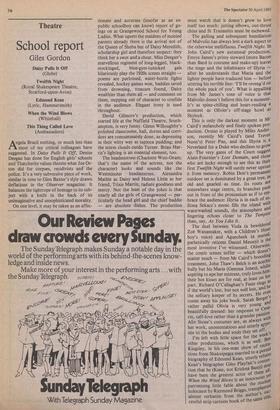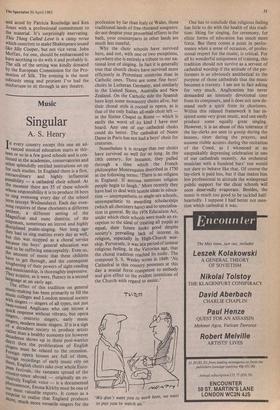Theatre
School report
Giles Gordon
Daisy Pulls It Off (Globe) Twelfth Night
(Royal Shakespeare Theatre, Stratford-upon-Avon)
Edmund Kean (Lyric, Hammersmith) When the Wind Blows (Whitehall) This Thing Called Love (Ambassadors)
Angela Brazil nothing, or much less than most of my critical colleagues have suggested. In Daisy Pulls It Off, Denise Deegan has done for English girls' schools and Thatcherite values therein what Joe Or- ton did for corpses, recidivists and the police. It's a very subversive piece of work, similar in tone to Glen Baxter's slyly drawn deflations in the Observer magazine. It balances the tightrope of homage to its sub- ject with a knife in the back of its unimaginative and unsophisticated morality.
On one level, it may be taken as an affec-
tionate and accurate (insofar as an ex- public schoolboy can know) report of go- ings on at Grangewood School for Young Ladies. What upsets the maidens of monied parents already there is the arrival not of the Queen of Sheba but of Daisy Meredith, scholarship girl and therefore suspect: they think her a swot and a cheat. Miss Deegan's marvellous regiment of long-legged, black-
stockinged, blue-gym-tunicked gals hilariously play the 1920s scenes straight poems are purloined, water-bottle fights revealed, hockey games won, baddies saved from drowning, treasure found, Daisy wealthier than them all — and comment on them, stepping out of character to confide in the audience. Elegant irony is used throughout.
David Gilmore's production, which started life at the Nuffield Theatre, South- ampton, is very funny. Glenn Willoughby's polished classrooms, hall, dorms and corri- dors are consummately done, as depressing in their witty way as tapioca pudding; and the storm clouds outdo Turner. Brian Har- ris's lighting is an essential element, too.
The headmistress (Charlotte West-Oram; that's the name of the actress, not the character) looks and sounds like the Westminster headmistress. Alexandra Mathie as Daisy and Helena Little as her friend, Trixie Martin, radiate goodness and mercy. Not the least of the jokes is that nearly all the girls of Grangewood — par- ticularly the head girl and the chief baddie — are absolute dishes. The production must watch that it doesn't grow to love itself too much: jutting elbows, out-thrust chins and St Trinianitis must be eschewed.
The gulling and subsequent humiliation of Malvolio has always lent a dark aspect to the otherwise mellifluous Twelfth Night. In John Caird's new autumnal production, Emrys James's prissy steward (more Bacon than Bard in costume and make-up) leaves the stage and the inhabitants of Illyria after he understands that Maria and the lighter people have traduced him — before uttering his terrible line: 'I'll be reveng'd on the whole pack of you'. What is appalling from Mr James's tone of voice is that Malvolio doesn't believe this for a moment. It's as spine-chilling and heart-rending a moment as Olivier's off-stage howl as Shylock.
This is only the darkest moment in Mr Caird's melancholy, and finely spoken pro- duction. Orsino is played by Miles Ander- son, recently Mr Caird's (and Trevor Nunn's) Peter Pan, and this Illyria is a Neverland for a Duke who declines to grow up. The very gates of the Court suggest Alain-Fournier's Lost Domain, and those who are lucky enough to see this as their first Twelfth Night will surely never uproot it from memory. Robin Don's permanent outdoor set is dominated by a great tree, as old and gnarled as time. Its roots are somewhere stage centre, its branches push out in front of the proscenium as if to em- brace the audience: Illyria is in each of us. Ilona Sekacz's music fills the island with waterwashed sounds, the atmosphere and lingering echoes closer to The Tempest than, say, As You Like It.
The duel between Viola (a bewildered
Zoe Wanamaker, with a Children's Hour boy's voice) and Aguecheek (a muted' pathetically reticent Daniel Massey) is the most inventive I've witnessed. Otherwise' the comic scenes suffer — which doesn't matter much — from Mr Caird's brooding treatment. John Thaw's Belch is an acerbic bully but his Maria (Gemma Jones), wh.tist, aspiring to ape her mistress, truly loves hint. their hot kisses are for real, at least on her part. Richard O'Callaghan's Feste sings as if the world's lost, but not well lost, and even
he the solitary keeper of its secrets. He
tosses away his joke book. Sarah Berger,s rather pallid Olivia is very young ah° beautifully dressed: her response to Cesa rio, calf-love rather than a grander passion: Alix Stone's costumes are, as always wdh her work, unostentatious and utterly apPy site to the bodies and souls they set off.,., s I'm left with little space for the vvee.' other productions, which is as well. 130. Kingsley, in his one-man show of recita- tions from Shakespeare married to a potted biography of Edmund Kean, utterly refittei_ Kean's biographer Giles Playfair's c.o. nl tion that he (Kean, not Krishna Banji) rri, have been the greatest actor of them h, When the Wind Blows is an innocuous Ye` patronising little fable about the nucle_ard holocaust by Raymond Briggs, transplant"... almost verbatim from the authors St!-e, cessful strip cartoon book of the same up and acted by Patricia Routledge and Ken Jones with a professional commitment to the material. It's surprisingly enervating. This Thing Called Love is a camp revue which contrives to make Shakespeare sound like Jilly Cooper, but not vice versa. John Moffatt, for one, should be embarrassed to have anything to do with it and probably is. The silk of the setting was kindly donated by the European Commission for the Pro- motion of Silk. The evening is the most odiously smug and prurient I've had the misfortune to sit through in any theatre.











































 Previous page
Previous page